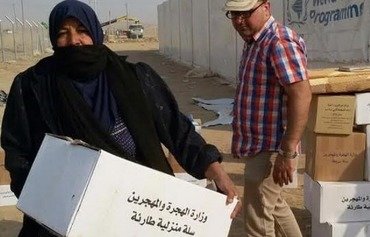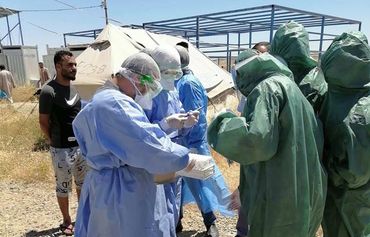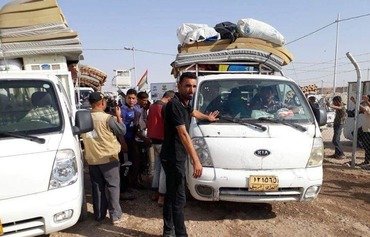Tears streamed from the eyes of an elderly Mosul resident as he identified the bodies of two family members killed by an improvised explosive device (IED) as they tried to flee from the "Islamic State of Iraq and the Levant" (ISIL).
The two were killed as they fled west Mosul towards the Iraqi forces and safety.
The old man lifted the blankets that had been placed by Iraqi troops over the bodies lying on the ground in order to identify them, one after the other.
"This is Allawi, and this is Dina," he said.
Then he collapsed to the ground, hitting himself on the head and saying "my life has been ruined", while the man accompanying him tried to soothe him.
An Iraqi soldier nearby expressed sorrow for the old man’s condition.
"The victims were killed by an IED planted by ISIL in order to prevent civilians from reaching the Iraqi army," the soldier said.
Incidents such as this one, however, have not deterred Mosul residents from fleeing towards the Iraqi forces since the operation to liberate the city began, with thousands escaping the city in the first few days alone.
Displaced face 'grave challenges'
"Internally displaced persons (IDPs) are suffering a great deal and face grave challenges," said Ninawa deputy governor Hasan al-Allaf, noting that Iraqi forces are working to liberate territory and evacuate IDPs at the same time.
Al-Allaf called on the Ministry of Migration and Displacement to redouble its efforts and provide IDPs with additional supplies of food and drinking water.
Before civilians can be transferred to displacement camps in al-Jadaa, Hamam al-Alil, al-Medraj and Hajj Ali, he told Diyaruna, Iraqi forces must check their information against an electronic database.
Some 250,000 IDPs are expected to flee western Mosul over the next few days as the Iraqi forces advance, according to the International Organisation for Migration.
"There is very serious concern for the life of 750,000 persons trapped in the densely-populated western sector, as the situation there deteriorates every day, according to reports and testimonials from those who have managed to escape," IOM press officer Hala Jaber said in a statement.
Iraqi MP Abed al-Rahim al-Shammari expressed his hopes that IDPs will soon be able to leave the camps to go back to their homes.
"Iraqi forces have allocated several vehicles to transporting IDPs from the battlefield to special holding centres, where their identity documents are checked before they are transferred to displacement camps," he told Diyaruna.
It is up to individuals to decide if they will remain in the camps or head for east Mosul, where they may have relatives to stay with, he said.
Camps are a 'temporary situation'
The Ministry of Migration and Displacement has made sure that food, drink and other necessities are available for those sheltering in the camps, said Minister of Migration and Displacement Jassim Mohammed.
The camps are being treated as a temporary measure, he said last month, so there is not much focus on setting up service facilities, such as schools.
"Our policy in building the camps is that this is a temporary situation that must end when their residential neighbourhoods are liberated," he said.
There are insufficient funds to set up such facilities in any case, he said, as the Iraqi government has only allocated one million Iraqi dinars ($850) per IDP, including cash grants and other services provided in displacement camps.
Despite these challenges, tents in most west Mosul camps are "very good" and they are equipped with all the basic necessities, Deputy Minister of Migration and Displacement Jassim Atiya told Diyaruna.
International and local organisations have offered vital support in setting up the camps, he said, with federal and local governmental support provided via agencies such as the Ninawa health directorate.
The directorate has equipped the camps with trailers where the sick or injured can receive first aid, he said.
The ministry’s plan is to return IDPs to their areas of residence after the Iraqi forces liberate and fully secure them, he added, so that the camps can be freed up to receive displaced residents from other areas.

![Displaced Mosul residents arrive at a camp outside the city. More than 26,000 have fled west Mosul over the last two weeks, according to the Iraqi Ministry of Migration and Displacement. [Photo courtesy of the Ministry of Migration and Displacement]](/cnmi_di/images/2017/03/13/7447-mosul-displaced-residents-600_384.jpg)






